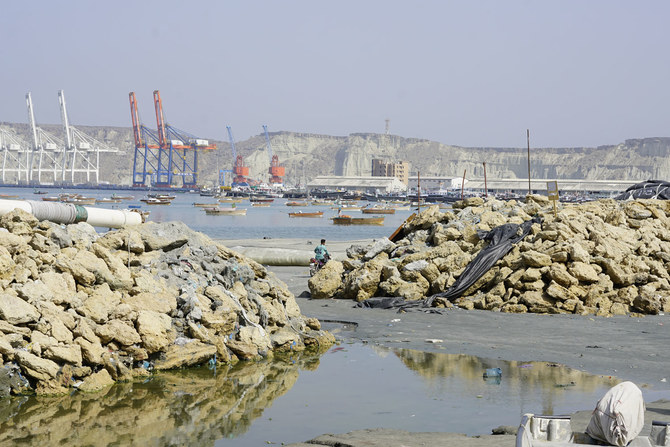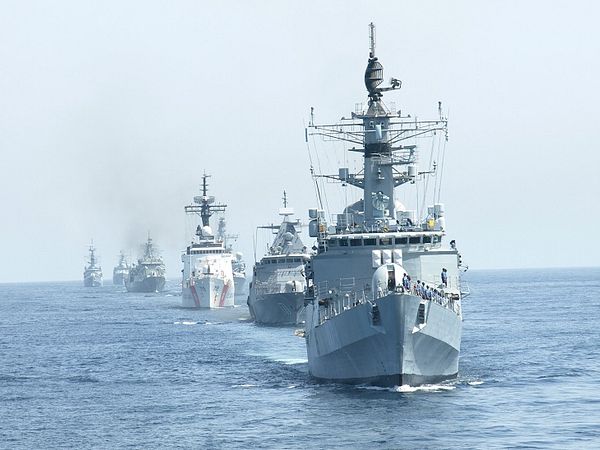The Arabian Sea
Arabian Sea is today one of the most important region in terms of the International trade routes that pass through it. At the same time it is volatile in terms of maritime activities. Its area is approximately 1,491, 0000 Sq. Miles, width being 1500 Miles with maximum depth of 4650 meters. It is bounded by Pakistan and Iran in the north, on the East by India, on the West by Arabian Peninsula, Somalia, Oman and Yemen. The most important water ways merging into Arabian Sea include Gulf of Aden in the southwest, connecting with Red Sea, the Gulf of Oman to the northwest connecting Persian/ Arabian Gulf. Apart from these Gulfs of Khambhat and Kutch are located in the Indian coast. However Indus River is the biggest river flowing into the sea.
The sea provides linkages to various trade routes, more prominent among these are the Gulf of Aden in the southwest connecting the Red Sea through Strait of Bab el-Mandeb, and the Gulf of Oman to the northwest linking the Persian/ Arabian Gulf. The littoral states around this sea are India, Pakistan, Maldives, Iran, Oman, Yemen, Djibouti and Somalia. Far East shipments/routes towards Malacca straits also pass through Arabian Sea.
International Trade Routes
Historically Arabian Sea has always played a dominating and significant role in International Shipping. Some canal networks like Suez were constructed in 1869 to provide access to sea. It continues to be major player in the shipping industry today in terms of volume of trade. Need for free flow of trade and transportation in this area has therefore become prime concern for all beneficiaries. Around 17 Million barrel Oil passes through Strait of Hormuz daily, around 3.5 Million through Bab al Mandeb, approximately 15 Million barrel oil passes towards Far East routes.
The need for free flow of trade and transportation in this area has therefore become of prime concern for all beneficiaries. Around 17 million barrels of oil pass through the Strait of Hormuz every day and around 3.5 million through Bab al Mandeb. Similarly approximately 15 million barrels of oil pass towards Far East routes and Malacca straits.
Security concerns
The security concerns in the area are many and are on increase. Asymmetric threats of trans-national nature are dominating the list. Maritime terrorism and Piracy issues follow closely. Narcotic, arms and human smuggling are other menaces which need to be controlled effectively. The quantum of threats are such that no single country is able to handle it alone. The collaborative maritime deployment under a unified command has therefore become necessity of time.
Pakistan Navy Rolein SafeGuarding International Trade
Ever since the region gained vital importance in terms of trade movements in recent times, the Pakistan Navy has played an effective and key role in its safeguard. Realizing the fact that it is one of the more prominent Navies in the littoral states, PN took upon itself a leading role in the defense of the area. Pakistan always believed in peaceful solution of regional issues and made concerted efforts to promote idea of peaceful co-existence. PN has been instrumental in implementing such policies and it participated wholeheartedly towards Collaborative Maritime Security and ensured cooperative approach for mutual advantages.
Pakistan Navy joined Combined Task Forces (CTF) 150 and in fact assumed leading role in its mission of maintaining peace and stability in maritime region. It ‘regularly contributed combat ships since its commissioning in April 2004 and successfully deterred a number of undesirable activities. Pakistan Navy can be well proud of commanding these Task Forces for record eight times. Through its dedicated commitments it has ensured safe and timely passage for the international trade and commercial activities. In the process PN gained very valuable experience in the field of joint operations with regional and international maritime forces. It provided tremendous boost in professional acumen of our Officers and sailors. In addition PN has successfully created a positive image as a competent and professional maritime force in the region.
After the adoption of ‘UNSC Resolution to launch combat against Piracy in the region in January 2009, PN also immediately joined the coalition of multinational navies as part of Combined Task Force 151. Since its inception PN commanded this CTF seven times and earned valuable admiration in combating the menace of piracy and along with 25 other ships of USA, Japan, Singapore and NATO countries it has patrolled an area of over 5 Million Square Nautical Miles. It has apprehended large number of suspected vessels and thwarted innumerable attacks on merchant ships. As a result of untiring efforts of PN in our EEZ and surrounding areas, the EEZ of Pakistan has been recently excluded form High Risk Area of Piracy, thus, making transit of ships safe and comfortable. Furthermore it should reduce the cost of Insurance etc.
The safe and prompt evacuation of large number of citizens of various countries from war affected areas of Yemen last year bears testimony to PN humanitarian relief activities in the western sector of the region. PN also rescued crew of strangulated ship off the coast of Oman few years ago. Earlier in 2005 PN ships participated in relief operation at port of Mali in Maldives after the disastrous Tsunami hit the area. It has taken part is Disaster Management Exercises since 2007 and geared up to meet any eventualities in the area of interest. Hosting of Indian Ocean Naval Symposium working group and Preparatory Workshop in September last year is another significant contribution of Pakistan Navy. Getting 28 delegations from 16 countries on one platform in order to formulate a uniform policy is also a notable step forward for sustainable peace in the region.
In the more prominent field of Maritime diplomacy PN regularly conducts AMAN exercises since 2007. Some 20 to 28 regional and extra regional countries take part in these mutually beneficial Operations. Apart from this, bilateral exercises with Navies of the Arabian Peninsula and with ships visiting Karachi port are common practices. Needless to say that Pakistan Navy trained Officers and Sailors of Gulf countries navies in their formative years. Number of PN trained officers rose to head their respective services. PN training institutes continue to remain their Alma Mater.
It can therefore be seen that Pakistan Navy has made remarkable contributions in safeguarding the shipping traffic in the Arabian Sea in general and North Arabian Sea in particular. It has also enhanced mutual cooperation a sea with friendly Maritime Forces No other country in the region done so much as Pakistan. The vital contribution has been acknowledged and appreciated by the world powers at large.

PN Contributions for the prosperity of the Region
The region has witnessed substantial activities in the field of economic development. A number of Countries are already extracting sizeable oil and gas products for their own use and for export. However some states including Pakistan are yet to draw benefits from the resources at sea.
Fortunately Pakistan is blessed with around 1000 Km coastal area from Gwadar Bay in the West to Sir Creek in the East. The exclusive economic Zone is 240000 Sq KM. With intensive and rigorous efforts initiated by Pakistan Navy and whole heartedly joined by National Institute of Oceanography another 50000 Sq. Kms area at Sea has been added as an Extension of Continental Shelf last Year. This is a historic achievement. Hydrographic Department of PN has played a leading role for the success of the project. Out of 80 Countries which submitted claims only 22 were successful in finalizing the claim; Pakistan was One of these and first in our area of interest. In the process very pertinent and useful data has been obtained, the information can lead to correct estimation of natural resources, mapping and to form a data base. The project therefore has potential to directly supplement further marine research and exploration of living and non-living resources in the region.
The Arabian Sea is well known for its deep water level and deltaic systems most suited for Oil and Gas exploration and other minerals. Indus river fan and Makran Coast therefore have prospects of huge reservoir of undersea wealth. Various agencies have carried out Surveys and studies to find the hidden treasures. International Seabed Authority has collected reliable data. According to available statistics Pakistan Continental Shelf and surrounding area in North Arabian Sea has Oil and gas reservoirs worth around Fourteen Thousand Million USO. Apart from this Manganese, Copper, Nickel, Cobalt metals worth over Ten thousand Million USO are reported in the region.
The above potential obviously can bring economic prosperity in the region. Pakistan has to exploit these resources for the interest of our people and area. Pakistan Navy will again play a leading role in advising and assisting Government Functionaries to undertake exploitation of Maritime Zones in a systematic manner.
China-Pakistan economic Corridor (CPEC) is strategically important for progress and prosperity of both Pakistan and China. Other countries in the region can also benefit from this development. In this respect Gwadar Port being the sea terminus assumes a special significance. It has numerous potentials. It can act as trans-shipment port for other ports and also can be utilized for transportation of cargo and goods for the land locked states of Central Asia and China. It will be of interest to know that Pakistan Navy was the first to point out the importance of its strategic location and carried out feasibility study for establishment of a port which could serve the purposes of both commercial and naval activities. Realizing the need for assuming pioneering role, PN commissioned a base at Gwadar in July 1987 with a jetty and started operations. It was named PNS Akram after a late former Naval Chief and Defence Minister Vice Admiral a R Khan. This stepping stone proved to be beginning of large scale development in the entire Makran Coast. Later on, this was augmented by creating Jinnah Naval Base at Ormara which is now fully function al and has the potential to grow as a Commercial port as well.
Gwadar port can also serve as a pivotal junction to connect land activities with economic foot prints at sea. As the maritime zones are developed, this port will gain even more active role. Pakistan Navy like in the past can always provide requisite help and security both sea ward and ashore to ensure smooth progress on development work. PN has already decided to deploy two more Marine Battalions at Gwadar area to ensure round the clock security of the port and Chinese Engineers employed at the sites.
PN is also participating in Nation Building process in coastal areas. It is concentrating on socio-economic uplift through educational institutions at Coastal towns of Ormara, Pasni, Turbat, and Gwadar including a recently established Cadet College at Ormara. In health sector, a modern 100 bed hospital PNS DARMAAN JAH has been commissioned at Ormara. Similar setups are expected to come up soon in other parts. To provide job opportunities to local population, recruitment center is established at Gwadar. With all these progressive activities and human resource developments, it is expected that the local populace will soon be able to join in the mainstream of work force in their province. Eventually as their homeland becomes more prosperous, the area and the inhabitants will also accrue benefits and get the due share in economic uplift.
Pakistan Navy can be very proud of its positive and substantial contributions in safeguarding the interests of those operating in the Arabian Sea. PN is also well geared up to provide all possible assistance for development of Maritime Zones and coastal areas of the homeland.




